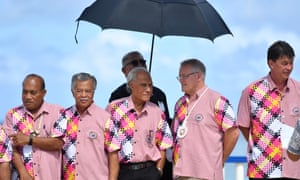Forum’s chair describes leaders’ 12 hours of talks as ‘very, very tough struggle’
Australia stands in opposition to other Pacific Islands nations after
distancing itself from language calling for urgent action on climate
change at a regional meeting in Tuvalu.
Eighteen leaders including Australia’s Scott Morrison, New Zealand’s Jacinda Ardern and Fiji’s Frank Bainimarama met for almost 12 hours at the Pacific Islands Forum (PIF), and its chair, Enele Sopoaga, the Tuvaluan prime minister, described the talks as “a very, very tough, difficult struggle”.
Some attending nations had hoped all 18 members would commit to policies to limit temperature rises to no more than 1.5C above pre-industrial levels, but the leaders agreed to an opt-out from specific measures they opposed.
A communique was passed with a qualification saying not all countries supported a strong statement issued by a group of small island Pacific states earlier in the week, which had called for an immediate global ban on the construction of new coal-fired power plants and coalmines and for all countries to rapidly phase out use of coal in the power sector.
Asked after the session if the qualification had come from a country starting with the letter A, Sopoaga laughed and said: “Yeah, absolutely.” Australia is the only such nation in the 18.
Morrison refused to be drawn about whether Australia was responsible for the qualification. “It’s not incumbent on any member state to endorse that statement, it’s a statement of the small Pacific states,” he said.
All references to coal were removed from the communique and the climate change statement, though references to the “climate change crisis”, which Sopoaga had earlier told the Guardian were disputed and looked likely to be replaced with “climate change reality”, remained.
Greenpeace said Australia’s plans to water down the
communique could make it “the pariah of the Pacific”. Joseph
Moeono-Kolio, the group’s head of Pacific, said: “How does Morrison
reconcile calling the Pacific family while he persistently ignores our
demands for Australia to reduce its emissions?” Eighteen leaders including Australia’s Scott Morrison, New Zealand’s Jacinda Ardern and Fiji’s Frank Bainimarama met for almost 12 hours at the Pacific Islands Forum (PIF), and its chair, Enele Sopoaga, the Tuvaluan prime minister, described the talks as “a very, very tough, difficult struggle”.
Some attending nations had hoped all 18 members would commit to policies to limit temperature rises to no more than 1.5C above pre-industrial levels, but the leaders agreed to an opt-out from specific measures they opposed.
A communique was passed with a qualification saying not all countries supported a strong statement issued by a group of small island Pacific states earlier in the week, which had called for an immediate global ban on the construction of new coal-fired power plants and coalmines and for all countries to rapidly phase out use of coal in the power sector.
Asked after the session if the qualification had come from a country starting with the letter A, Sopoaga laughed and said: “Yeah, absolutely.” Australia is the only such nation in the 18.
Morrison refused to be drawn about whether Australia was responsible for the qualification. “It’s not incumbent on any member state to endorse that statement, it’s a statement of the small Pacific states,” he said.
All references to coal were removed from the communique and the climate change statement, though references to the “climate change crisis”, which Sopoaga had earlier told the Guardian were disputed and looked likely to be replaced with “climate change reality”, remained.
The low-lying Pacific islands are on the frontline of the climate crisis, battling rising sea levels and related problems that have forced some residents to move to higher ground.
Ardern warned Australia on Wednesday that it would have to answer to the Pacific for its climate change policy.
Other Pacific leaders have repeatedly called for Australia to move away from coal. Bainimarama appealed to Canberra on Monday to “do everything possible to achieve a rapid transition from coal to energy sources that do not contribute to climate change”. He said coal posed an “existential threat” to Pacific islands.
Morrison brought a lump of coal into the Australian parliament in 2017 when he was treasurer and taunted the opposition, saying to jeers from other members of his own party: “This is coal. Don’t be afraid, don’t be scared. It won’t hurt you, it’s coal.”
Morrison’s Liberal party has voiced support for the Carmichael coalmine planned for the Galilee Basin in Queensland, which is forecast to create annual emissions similar to those from countries such as Malaysia and Austria and more than those of New York City.
In Tuvalu, which could be uninhabitable within decades as a result of rising sea levels, Sopoaga expressed disappointment with the result of the communique, saying: “I think we should have done more work for our people.”
He urged leaders to focus on “survival, not saving the economies of countries”.

No comments:
Post a Comment